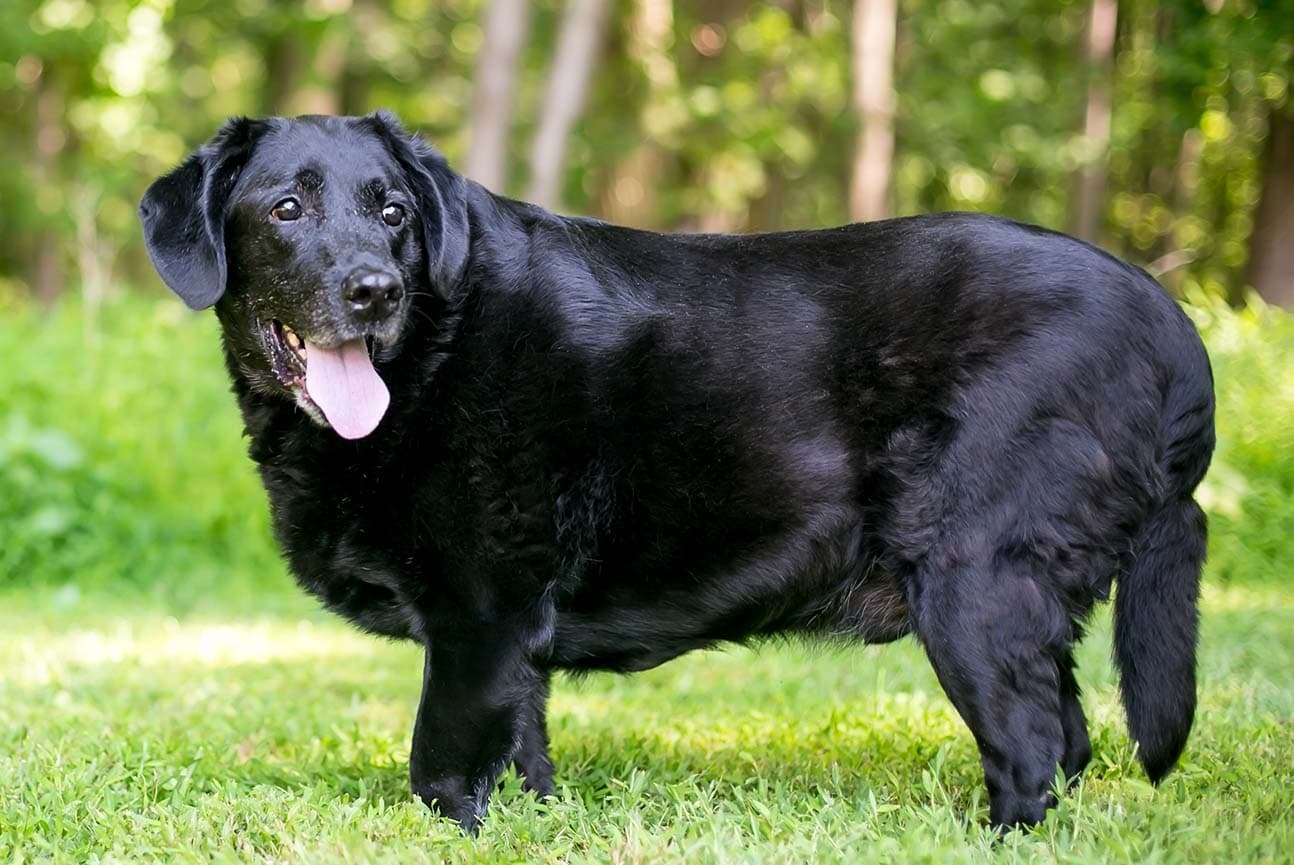Reviewed by Dr. Kirill Hammoud
Updated on 16/10/2025
Reading time 4 min.
Overview
Severity: Low
Life stage: All
Dog obesity is one of the most common and concerning health challenges facing our pets. This condition is shortening our pets’ lives and significantly reducing their quality of life. The climate and lifestyle factors in Dubai present both challenges and opportunities for maintaining your dog’s healthy weight.
The good news? Obesity is entirely preventable and treatable with the right approach and professional guidance.
What Is Dog Obesity?
When dogs take in more calories than they use up through activity and normal body processes, the extra energy is stored as body fat. While this may not seem like a big deal at first, carrying too much fat can create serious problems throughout the body.
Poor blood flow in fat tissue creates inflammation, which then releases harmful signals that spread through the body. Over time, this ongoing inflammation can damage the body and increase the risk of issues such as arthritis, diabetes, heart disease, and kidney trouble.
In Dubai, the extreme summer heat adds another challenge. Outdoor exercise often drops during the hottest months, which means dogs can gain weight more easily if their diet and activity aren’t carefully managed.
Why Does Dog Obesity Happen?
Obesity is a complex disease with multiple factors working together. Understanding these causes helps develop effective prevention and treatment strategies.
Common Contributing Factors:
- Overfeeding and overeating
- Inappropriate diet choices, such as low-quality foods or unsuitable formulations
- Excessive treats, especially human food
- Insufficient exercise
- Genetic predisposition: Some breeds (particularly Labradors) have genetic variations affecting satiety
- Underlying medical conditions that affect mobility, appetite, or metabolism
- Boredom and stress
Dubai-Specific Challenges:
- Limited outdoor exercise opportunities during the summer months
- Reliance on air-conditioned indoor environments
Recognising the Signs and Symptoms
Gradual weight gain often goes unnoticed until it becomes significant. Many owners first realise their dog is overweight when a veterinary professional mentions it during a routine visit.
Physical Signs:
- Difficulty feeling ribs or backbone beneath the skin
- Rounded, sagging belly when viewed from the side
- Chubbier face and neck leading to tighter-fitting collars
- Visible padding around the lower back and tail base
- No visible waist definition when viewed from above or side
Behavioural Changes:
- Reluctance to exercise or a slower walking pace
- Excessive panting
- Increased tiredness and sleeping
- Difficulty jumping onto furniture or into vehicles
- Reduced interest in play and interaction
- Seeking cooler spots more frequently
Climate Considerations: In Dubai’s heat, distinguishing between heat-related panting and obesity-related breathing difficulties is important but may be difficult. Overweight dogs struggle significantly more with temperature regulation. Speak to your vet as soon as you notice any problems.
Risk Factors: Is Your Dog at Higher Risk of Obesity?
Breed Predispositions
- Pugs and other brachycephalic (flat-faced) breeds
- Golden Retrievers and Labrador Retrievers
- Beagles and Border Terriers
- English Springer Spaniels
Lifestyle Risk Factors
- Age: Senior dogs have slower metabolisms
- Sex: Female dogs show slightly higher rates
- Neuter status: Neutered dogs have an increased risk
- Existing joint problems: Limiting mobility and exercise
- Owner lifestyle: Less active owners often have less active dogs
Dubai Environmental Factors
- Apartment living with limited space
- Reduced exercise during extreme weather
- Indoor lifestyle reducing natural activity levels
- Cultural differences in pet-keeping practices
Health Complications: The Serious Consequences
Obesity significantly impacts your dog’s health and lifespan, with effects ranging from mild discomfort to life-threatening conditions.
Immediate Health Impacts:
- Reduced lifespan
- Mobility problems, especially arthritis
- Breathing difficulties, particularly dangerous for flat-faced breeds, in Dubai’s heat
- Heat intolerance
- Reduced energy
Long-term Health Complications:
- Cardiovascular disease
- Diabetes mellitus
- Pancreatitis
- Kidney disease
- Certain cancers
- Anaesthetic or surgical complications
Dubai Climate Considerations: Overweight dogs struggle more in hot weather. Extra fat acts like insulation, and being out of shape makes it harder for them to cool down. Together, this can quickly turn dangerous during Dubai’s intense summer months.
Vet Diagnosis and Assessment
Veterinary professionals use standardised scoring systems (usually 1-5 or 1-9 scales) called the “body condition score (BCS) to assess your dog’s body condition (IMAGE)
The assessment includes:
- Rib examination: Feeling for ribs without excess fat coverage
- Spinal assessment: Checking backbone prominence
- Waist evaluation: Visual and tactile assessment from above and side
- Hip and shoulder examination: Feeling bony landmarks
- Overweight: 10% above ideal body weight
- Obese: 20% or more above the ideal body weight
Treatment Approaches: A Comprehensive Solution
Successful obesity treatment requires professional support combined with committed home care.
1. Prescription Diet Foods
- Promote steady weight loss whilst maintaining satiety
- Ask your vet to recommend the diet that’s best suited for your dog’s needs
2. Medical Support
- Monthly weight checks and health assessments
- Addressing any underlying medical issues
Home Management: Where Real Change Happens
Your vet can guide the process, but lasting weight loss depends on the daily care and consistency you provide at home.
Dietary Management
- Portion control: Measure meals with a cup or kitchen scale instead of guessing.
- Slow feeders: Help your dog eat slower and feel fuller.
- Control treats: Choose healthy, low-calorie options instead of high-fat snacks.
Exercise and Activity
- Early morning/late evening exercise to avoid peak heat hours
- Swimming programmes: Excellent low-impact exercise
- Indoor activities: Puzzle toys, indoor agility, stair climbing, training sessions
Monitoring Progress
- Photo documentation: Visual progress tracking
- Behaviour logging: Noting energy levels and activity improvements
Prevention: The Best Medicine
It’s much easier to prevent obesity than fix it later. The best approach is building healthy habits early and keeping them up throughout your dog’s life.
Nutrition
- Feed a diet that matches your dog’s age and activity level.
- Stick to feeding guidelines and adjust portions if treats are given.
- Choose healthy treats and offer them in moderation.
- Keep meal times and portion sizes consistent.
Lifestyle
- Commit to daily exercise, adjusting for Dubai’s heat.
- Ensure regular playtime for mental and physical stimulation.
- Monitor your dog’s weight monthly to spot changes early.
- Arrange yearly vet visits for professional guidance and body condition checks.
When to Seek Immediate Veterinary Care
Obesity usually develops gradually, but certain situations require urgent attention:
- Collapse or inability to stand
- Severe breathing difficulties
- Heat stroke symptoms, including excessive panting, drooling, weakness
- Bloat signs: a suddenly swollen abdomen and unproductive vomiting attempts
- Complete loss of appetite, especially in very hot weather
Dubai Climate Emergencies: Given Dubai’s extreme heat, overweight dogs are at particular risk for heat-related emergencies. Never underestimate breathing difficulties in hot weather. Modern Vet Hospital has excellent 24-hour veterinary facilities, don’t hesitate to seek help if you’re concerned about your dog’s condition.
What to expect
Dog obesity is a serious condition but manageable with the right care. In Dubai’s challenging climate, success comes from consistency, professional support, and mindful home routines. Every step, whether prevention or weight loss, improves your dog’s health, lifespan, and happiness.
Concerned about your dog’s weight? Book a consultation today at Modern Vet Hospital in Dubai. Our experienced team provides obesity diagnostics, personalised weight loss programmes, and ongoing support tailored to your dog’s needs. Your trusted partner for comprehensive canine obesity care in Dubai.
Share this, choose your platform!
Reviewed by
Dr. Kirill Hammoud
DVM
Dr. Kirill was born in Belarus, that same year he and his family relocated to Lebanon. It was here that Dr. Kirill was raised and lived most of his formative years. He was brought up around animals and had many pets growing up, which he believes to be the reason behind his intense compassion and love for animals and his deep rooted drive to help them live better quality lives.


